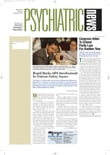Medical organizations and treatment facilities have given patient-safety issues a prominent place on their agenda in the last few years, and APA has been no exception.
At its November 24-25 meeting, the APA Board of Trustees gave its strong endorsement to a series of patient-safety recommendations developed by APA’s Task Force on Patient Safety, which was established in October 2001.
Noting that a commitment to improving patient safety will require providers and facilities to engineer “a profound change in the clinical culture,” task force co-chair Alfred Herzog, M.D., described three areas on which the task force believes psychiatrists and mental health professionals should focus their efforts—preventable adverse medication events, seclusion and restraint, and suicide in inpatient and residential settings.
The task force report urges APA district branches to “commit to the improvement of patient safety” by offering their members educational programs on this issue. It also encourages individual psychiatrists to “commit to the delivery of safe care and to participate in educational, organizational, and institutional activities intended to improve patient safety in their various practice settings.”
The report calls on the Board of Trustees to spearhead APA’s leadership on patient-safety issues, which should include collaborations with other health care providers, organizations, and systems and with patients and their families.
The report points out several recommendations to improve patient safety in the three focus areas. Concerning adverse medication events, the task force suggests, for example, that APA leaders promote greater use of “clinical-decision support systems and computerized physician order entry programs.”
To achieve the “safe and appropriate” use of seclusion and restraint, APA should “encourage psychiatric programs, facilities, and systems to track restraint and seclusion rates and share research findings and clinical experience about best practices.”
On the issue of suicide-reduction strategies, the task force calls on APA to promote the exchange of and research on “best practices concerning suicide assessment and intervention among psychiatric organizations, JCAHO, and the federal Centers for Medicare and Medicaid Services.” APA should also “encourage national and state regulatory and accrediting agencies to establish valid, protected registries of suicides” and to make these data readily available.
In addition, the report urges APA to create the Committee on Patient Safety and encourages the medical director to devote a portion of existing APA funds and staff “to promote and advance patient safety in the near term and sustain its momentum as an enduring program into the future.” The task force hopes that additional funds can be obtained to expand APA’s work in this area.
In other actions, the Board of Trustees voted to
• have incoming Medical Director James Scully, M.D., find funds from the 2003 budget to hire a psychiatrist director for the APA Office of Minority/National Affairs, with the goal of filling the position at mid-year. The position has been vacant for several years, and a number of Trustees maintained that the vacancy has angered many minority psychiatrists and suggests that APA is reducing its commitment to addressing the needs of minority psychiatrists and their patients.
• ask the president-elect to appoint an APA member from the Black Psychiatrists of America and the National Medical Association’s Psychiatry and Behavioral Sciences Section as corresponding members of the APA Committee of Black Psychiatrists.
• approve a new education option as a way to resolve ethics charges filed against a member. District branches would be able to instruct a member to fulfill educational requirements in response to an ethics complaint, and since this is not categorized as a sanction, the member’s name would not be reported to the National Practitioner Data Bank (Psychiatric News, December 6).
• support a change to the APA Bylaws designating the president-elect as the officer who would take over the presidency if an APA president was unable to continue in that role. At present, the Board chooses one of APA’s two vice presidents to succeed a deceased or incapacitated president.
• respond to the steadily decreasing number of members who cast a vote on Bylaws changes by having the Bylaws Committee develop wording to lower the voting requirement percentage needed to amend the Bylaws from 33 1/3 percent to 25 percent.
• back the “concept” of three membership-related issues—an affiliate member category for patients, family members, policymakers, and advocates; a dues-payment incentive for members who pay their dues by December 31; and a prepaid membership application available at APA annual meetings that would allow psychiatrists who join APA at that time to qualify for the lower registration fee paid by members. The Membership Committee is to develop detailed plans for each and report back to the Board.
• appoint a work group to focus on and respond to “the drastic reduction of inpatient bed capacity” that has caused a crisis for patients suffering from psychiatric disorders, including substance abuse.
• increase by $15 advanced and on-site registration fees for APA’s Institute on Psychiatric Services. This will begin for the 2003 meeting and applies to all registration categories except members-in-training, who will continue to pay the current fee.
• invite the American Association of Community Psychiatrists to join with APA in planning the program of the Institute on Psychiatric Services.
• seek outside funds to convene a one-day conference on mental illness and homelessness. APA members and other experts attending such a meeting would “identify, examine, distill, and report on current issues regarding mental illness and homelessness.”
• endorse a position statement backing adoption and co-parenting of children by same-sex couples. Position statements become official policies of APA.
• support a position statement that describes the “minimum necessary” information that should be released to third parties in conjunction with the federal government’s new medical privacy rules.
• amend the APA position statement on HIV infection to add a call for psychiatrists to “counter the negative effects of stigma, discrimination, violence, trauma, and mental disorders on the needs of the infected or affected by HIV.”
• approve a position statement emphasizing that any state or federal bills providing insurance parity for mental illnesses include substance abuse disorders in the coverage mandate.
• establish APA as a plaintiff in a national class-action lawsuit against large managed care companies. The suit charges them with violating the federal racketeering law known as RICO (Psychiatric News, October 18, May 3).
The APA Executive Committee acted on several urgent matters that had to be decided before the full Board convened late last month. The committee voted to
• include the Division of Government Relations in the move to the new APA headquarters in Arlington, Va., this month. The Board had originally agreed to rent space in the District of Columbia for that division, but the committee decided it would be more efficient and less expensive to house all APA offices in one building.
• approve funding requests from the California Psychiatric Association, Nevada Psychiatric Association, and New Hampshire Psychiatric Society. The funds, which will come from the APA Committee on Advocacy and Litigation Funding, will be used to address medical-practice issues.
Many of APA’s position statements are posted on APA’s Web site at www.psych.org/libr_publ/position.htm. APA members can access the summary of Board actions at www.psych.org/members/bot/bot.cfm under “Members Corner.” ▪

